Unit 1 Where did you go on vacation Section A Grammar focus-3c 课件 (共27张PPT)
文档属性
| 名称 | Unit 1 Where did you go on vacation Section A Grammar focus-3c 课件 (共27张PPT) | 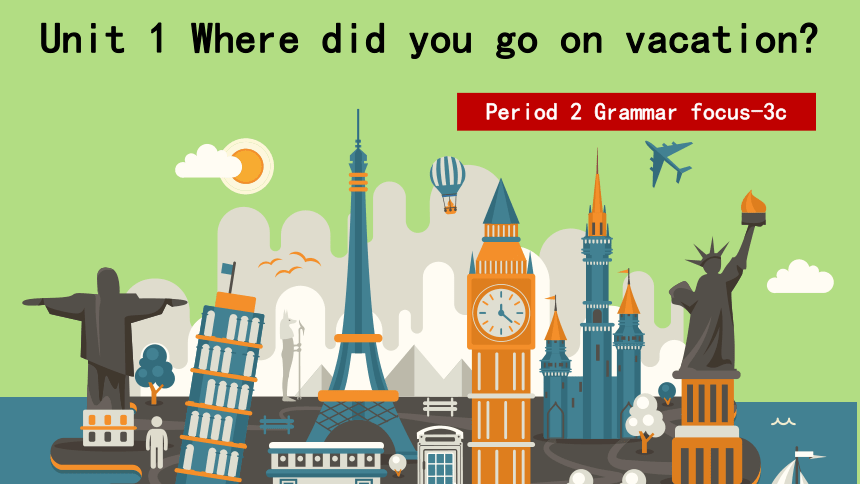 | |
| 格式 | pptx | ||
| 文件大小 | 516.8KB | ||
| 资源类型 | 教案 | ||
| 版本资源 | 人教新目标(Go for it)版 | ||
| 科目 | 英语 | ||
| 更新时间 | 2023-09-05 18:09:02 | ||
图片预览

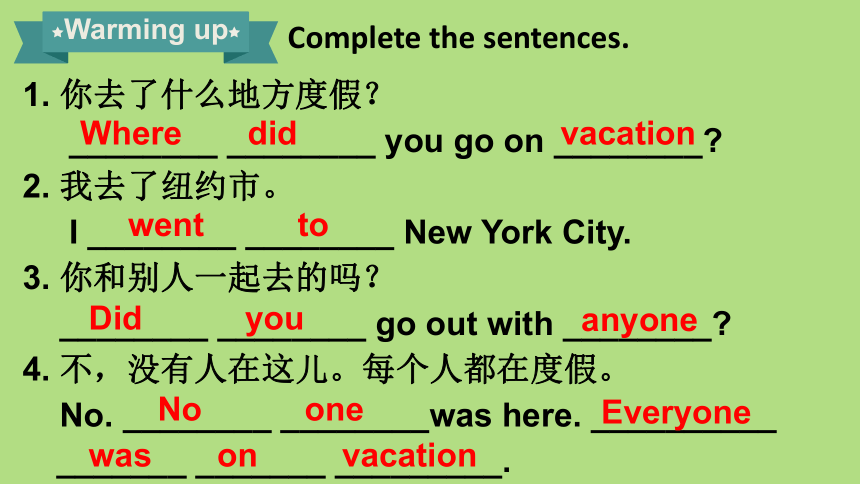
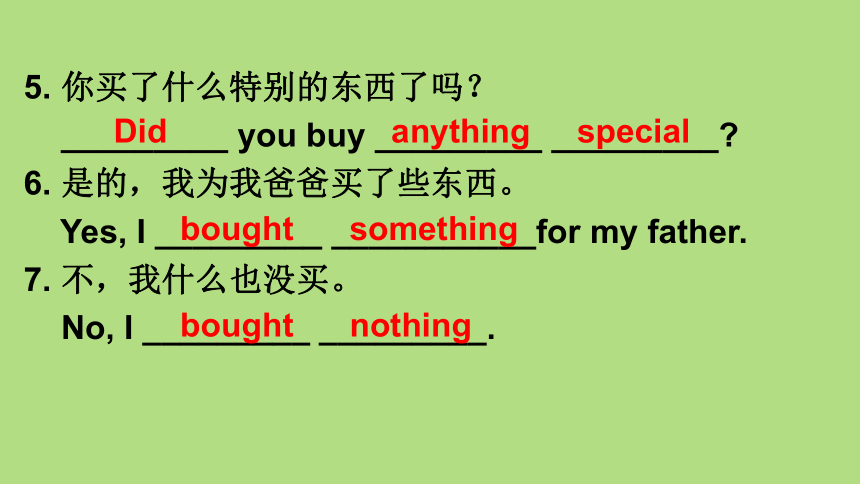
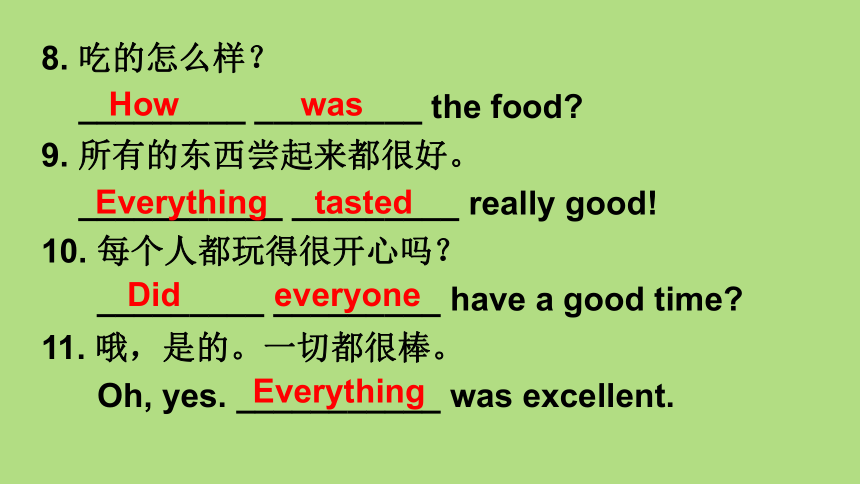
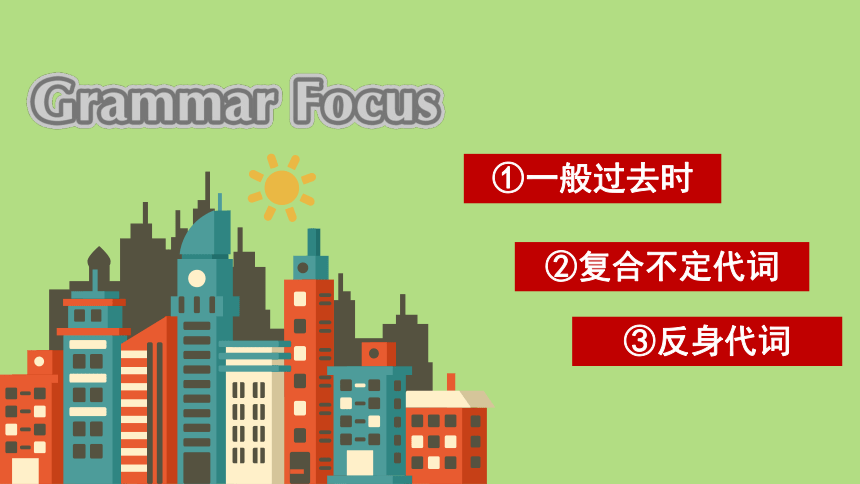
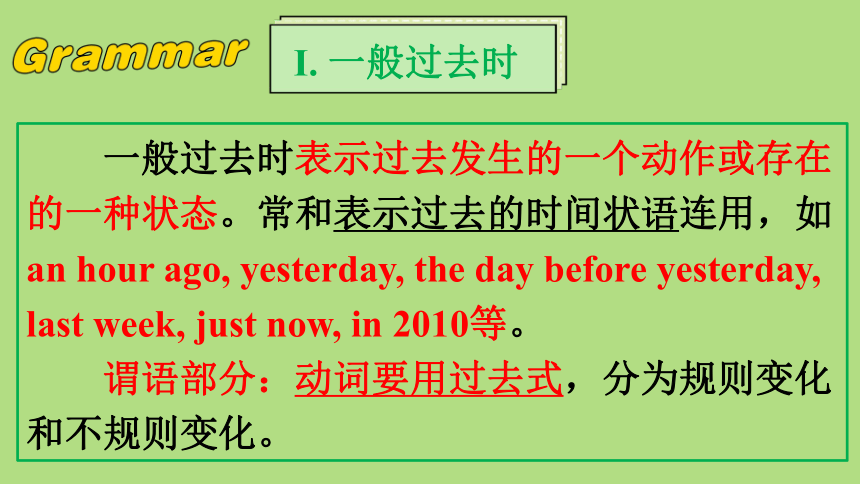
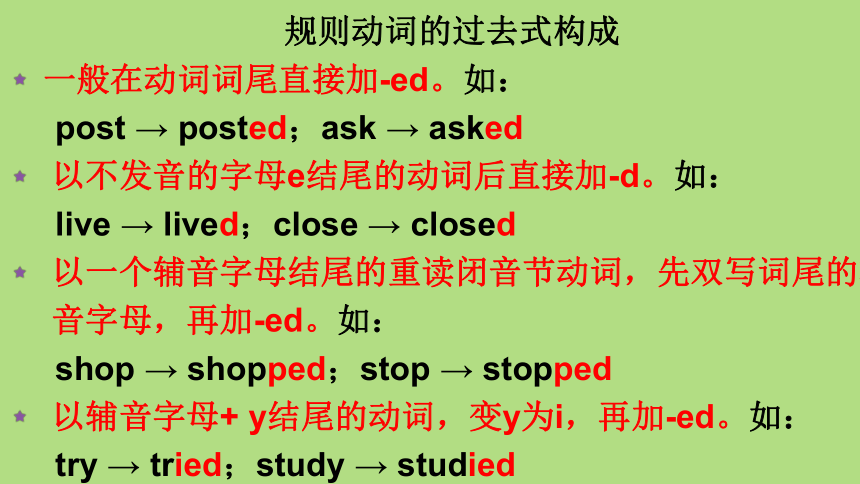
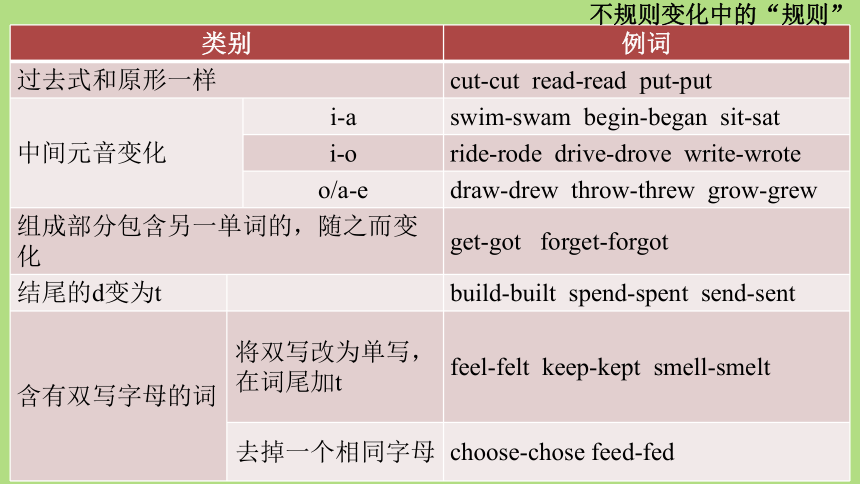
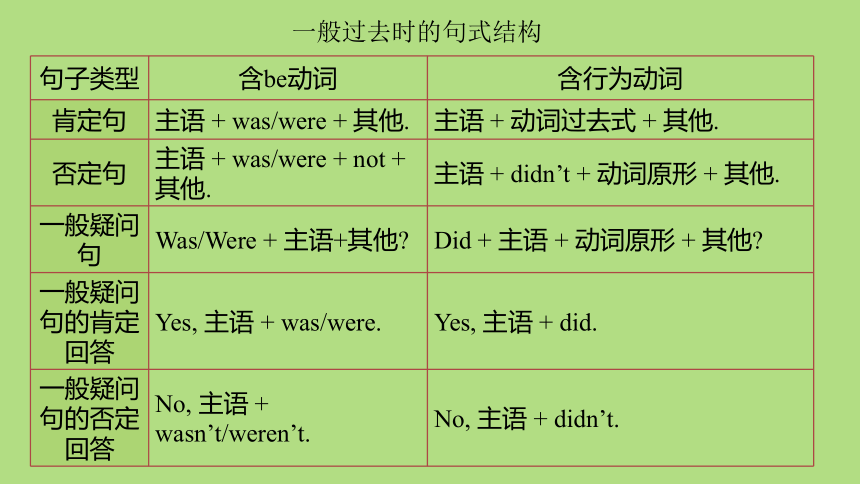
文档简介
(共27张PPT)
Unit 1 Where did you go on vacation
Period 2 Grammar focus-3c
Warming up
1. 你去了什么地方度假?
________ ________ you go on ________
2. 我去了纽约市。
I ________ ________ New York City.
3. 你和别人一起去的吗?
________ ________ go out with ________
4. 不,没有人在这儿。每个人都在度假。
No. ________ ________was here. __________ _______ _______ _________.
vacation
Where did
went to
Complete the sentences.
No one
Everyone
was on vacation
Did you
anyone
5. 你买了什么特别的东西了吗?
_________ you buy _________ _________
6. 是的,我为我爸爸买了些东西。
Yes, I _________ ___________for my father.
7. 不,我什么也没买。
No, I _________ _________.
anything special
Did
bought something
bought nothing
8. 吃的怎么样?
_________ _________ the food
9. 所有的东西尝起来都很好。
___________ _________ really good!
10. 每个人都玩得很开心吗?
_________ _________ have a good time
11. 哦,是的。一切都很棒。
Oh, yes. ___________ was excellent.
How was
Everything tasted
Did everyone
Everything
①一般过去时
②复合不定代词
③反身代词
I. 一般过去时
一般过去时表示过去发生的一个动作或存在的一种状态。常和表示过去的时间状语连用,如an hour ago, yesterday, the day before yesterday, last week, just now, in 2010等。
谓语部分:动词要用过去式,分为规则变化和不规则变化。
规则动词的过去式构成
一般在动词词尾直接加-ed。如:
post → posted;ask → asked
以不发音的字母e结尾的动词后直接加-d。如:
live → lived;close → closed
以一个辅音字母结尾的重读闭音节动词,先双写词尾的辅音字母,再加-ed。如:
shop → shopped;stop → stopped
以辅音字母+ y结尾的动词,变y为i,再加-ed。如:
try → tried;study → studied
类别 例词
过去式和原形一样 cut-cut read-read put-put
中间元音变化 i-a swim-swam begin-began sit-sat
i-o ride-rode drive-drove write-wrote
o/a-e draw-drew throw-threw grow-grew
组成部分包含另一单词的,随之而变化 get-got forget-forgot
结尾的d变为t build-built spend-spent send-sent
含有双写字母的词 将双写改为单写,在词尾加t feel-felt keep-kept smell-smelt
去掉一个相同字母 choose-chose feed-fed
不规则变化中的“规则”
一般过去时的句式结构
句子类型 含be动词 含行为动词
肯定句 主语 + was/were + 其他. 主语 + 动词过去式 + 其他.
否定句 主语 + was/were + not + 其他. 主语 + didn’t + 动词原形 + 其他.
一般疑问句 Was/Were + 主语+其他 Did + 主语 + 动词原形 + 其他
一般疑问句的肯定回答 Yes, 主语 + was/were. Yes, 主语 + did.
一般疑问句的否定回答 No, 主语 + wasn’t/weren’t. No, 主语 + didn’t.
Where did you go on vacation I went to New York City
Did you go out with anyone No. No one was here. Everyone was on vacation.
Did you buy anything special Yes, I bought something for my father.
No, I bought nothing.
How was the food Everything tasted really good!
Did everyone have a good time Oh, yes. Everything was excellent.
II. 复合不定代词
Classification
For people For things
everyone
someone
nothing
anyone
something
anything
no one
everything
For people
everyone
someone
anyone
no one
any +one
任何人
every + one
每人;人人
no one 要分开
没有人
some + one
某人
For things
nothing
something
anything
everything
some + thing
某事
every + thing
每件事,所有事
any + thing
任何事物
no + thing
没有什么
some-类 any-类 no-类 every-类
-body somebody某人 anybody 任何人 nobody 没有人 Everybody
每人
-one someone 某人 anyone 任何人 no one 没有人 everyone
每人
-thing something 某事,某物 anything 任何东西 nothing 没有什么 everything
每件事;
-where somewhere 某处 anywhere 任何地方 nowhere 没有地方 everywhere
每处
前缀
后缀
Let’s do something interesting.
当定语(形容词、不定式、else等)修饰复合不定代词时,定语要后置。
e.g. 这本书里有什么新东西吗?
Is there _________ _________ in this book
今天没有什么特别的事。
There’s _________ _________ today.
anything new
nothing special
复合不定代词的用法
Everyone in this village is friendly.
Nobody knows what the future will be like.
复合不定代词作主语时,谓语动词用单数形式。
e.g. Something ______(is/are) wrong with my watch. 我的手表出了点毛病。
Well, everyone ______ (want) to win.
是的,每个人都想赢。
is
wants
some-类和any-类复合不定代词的用法区别
some-类复合不定代词 any-类复合不定代词
肯定句 常用于肯定句 若any-类复合不定代词用于肯定句时,表示“随便哪个,任何哪个”
疑问句 在表示请求并希望得到对方肯定回答的疑问句中,要用some-类复合不定代词 常用于疑问句中
否定句 常用于否定句中
例句 ①There is something wrong with my bike. ②Would you like something to drink ①Anybody can see that it’s wrong.
②Is there anyone at home
③The old lady couldn’t see anything at all.
III. 反身代词
I bought something for my father, but nothing for myself.
He is talking to himself.
反身代词:做宾语
1. 用于主语和宾语是同一人的情况下
2. 固定搭配中,如:enjoy oneself 玩的开心
by oneself 独自做…
第一人称 第二人称 第三人称
单数人称 myself 我自己 yourself 你自己 himself 他自己
herself 她自己
itself 它自己
复数人称 ourselves 我们自己 yourselves 你们自己 themselves
他们自己
构成:一/二人称:形物+self/selves(复数时把f改为v再+es)
三人称:宾格+self/selves
Fill in the blanks with the words in the box and practice the conversation.
anyone, something, anything, everything, nothing
Linda: Did you do _________ fun on your vacation, Alice
Alice: Yes, I did. I went to Sanya.
Linda: How did you like it
Alice: Well, it was my first time there, so __________ was really interesting.
anything
everything
Linda: Did you go with ________
Alice: Yes, I did. I went with my sister.
Linda: Did you go shopping
Alice: Of course! I bought __________ for my parents, but _________ for myself.
Linda: Why didn’t you buy ________ for yourself
Alice: I didn’t really see _________ I liked.
anyone
something
nothing
anyone, something, anything, everything, nothing
anything
anything
anything, everything, nothing, everyone, no one
Fill in the blanks in the e-mail message with the words in the box.
Dear Bill,
How was your vacation Did you do __________ interesting Did ________________ in the family go with you I went to a friend’s farm in the countryside with my family.
anything
everyone
______________ was great. We fed some hens and saw some baby pigs. They were so cute! The only problem was that there was ______________ much to do in the evening but read. Still ______________ seemed to be bored. Bye for now!
Mark
Everything
nothing
no one
Did you … Everyone Someone (name) No one
eat anything at a restaurant
read anything interesting
visit anyone in your family
buy anything
keep a diary
Ask your group questions about their last vacation. Then tell the class your results.
keep a diary 记日记
n. 日记; 记事薄
go shopping 购物
keep a diary 记日记
the only problem 唯一的问题
nothing much to do but read 除了读书没什么事可做
seem to be … 似乎是……/好像是……
in the countryside 在乡下
feed hens 喂母鸡
Bye for now. 再见。
I. 根据汉语意思,完成英语句子,每空词数不限。
1. 报纸上没有什么有趣的新闻。
There is ____________________ in the newspaper.
2. 样样精通,样样稀松(什么都知道等于什么都不知道)。
To ____________________ is to know nothing.
3. 听!有人正在隔壁房间走动。
Listen! ______________________ walking around in the next room.
nothing interesting
know everything
Someone / Somebody is
4. 他们没有任何可吃的东西了。
They didn't ____________________ to eat.
5. 每个人都需要朋友。
__________________________ friends.
6. 没有水和空气,没有人能活下去。
_______________________ without water or air.
have anything
Everyone / Everybody needs
No one / Nobody can live
Thank You!
Unit 1 Where did you go on vacation
Period 2 Grammar focus-3c
Warming up
1. 你去了什么地方度假?
________ ________ you go on ________
2. 我去了纽约市。
I ________ ________ New York City.
3. 你和别人一起去的吗?
________ ________ go out with ________
4. 不,没有人在这儿。每个人都在度假。
No. ________ ________was here. __________ _______ _______ _________.
vacation
Where did
went to
Complete the sentences.
No one
Everyone
was on vacation
Did you
anyone
5. 你买了什么特别的东西了吗?
_________ you buy _________ _________
6. 是的,我为我爸爸买了些东西。
Yes, I _________ ___________for my father.
7. 不,我什么也没买。
No, I _________ _________.
anything special
Did
bought something
bought nothing
8. 吃的怎么样?
_________ _________ the food
9. 所有的东西尝起来都很好。
___________ _________ really good!
10. 每个人都玩得很开心吗?
_________ _________ have a good time
11. 哦,是的。一切都很棒。
Oh, yes. ___________ was excellent.
How was
Everything tasted
Did everyone
Everything
①一般过去时
②复合不定代词
③反身代词
I. 一般过去时
一般过去时表示过去发生的一个动作或存在的一种状态。常和表示过去的时间状语连用,如an hour ago, yesterday, the day before yesterday, last week, just now, in 2010等。
谓语部分:动词要用过去式,分为规则变化和不规则变化。
规则动词的过去式构成
一般在动词词尾直接加-ed。如:
post → posted;ask → asked
以不发音的字母e结尾的动词后直接加-d。如:
live → lived;close → closed
以一个辅音字母结尾的重读闭音节动词,先双写词尾的辅音字母,再加-ed。如:
shop → shopped;stop → stopped
以辅音字母+ y结尾的动词,变y为i,再加-ed。如:
try → tried;study → studied
类别 例词
过去式和原形一样 cut-cut read-read put-put
中间元音变化 i-a swim-swam begin-began sit-sat
i-o ride-rode drive-drove write-wrote
o/a-e draw-drew throw-threw grow-grew
组成部分包含另一单词的,随之而变化 get-got forget-forgot
结尾的d变为t build-built spend-spent send-sent
含有双写字母的词 将双写改为单写,在词尾加t feel-felt keep-kept smell-smelt
去掉一个相同字母 choose-chose feed-fed
不规则变化中的“规则”
一般过去时的句式结构
句子类型 含be动词 含行为动词
肯定句 主语 + was/were + 其他. 主语 + 动词过去式 + 其他.
否定句 主语 + was/were + not + 其他. 主语 + didn’t + 动词原形 + 其他.
一般疑问句 Was/Were + 主语+其他 Did + 主语 + 动词原形 + 其他
一般疑问句的肯定回答 Yes, 主语 + was/were. Yes, 主语 + did.
一般疑问句的否定回答 No, 主语 + wasn’t/weren’t. No, 主语 + didn’t.
Where did you go on vacation I went to New York City
Did you go out with anyone No. No one was here. Everyone was on vacation.
Did you buy anything special Yes, I bought something for my father.
No, I bought nothing.
How was the food Everything tasted really good!
Did everyone have a good time Oh, yes. Everything was excellent.
II. 复合不定代词
Classification
For people For things
everyone
someone
nothing
anyone
something
anything
no one
everything
For people
everyone
someone
anyone
no one
any +one
任何人
every + one
每人;人人
no one 要分开
没有人
some + one
某人
For things
nothing
something
anything
everything
some + thing
某事
every + thing
每件事,所有事
any + thing
任何事物
no + thing
没有什么
some-类 any-类 no-类 every-类
-body somebody某人 anybody 任何人 nobody 没有人 Everybody
每人
-one someone 某人 anyone 任何人 no one 没有人 everyone
每人
-thing something 某事,某物 anything 任何东西 nothing 没有什么 everything
每件事;
-where somewhere 某处 anywhere 任何地方 nowhere 没有地方 everywhere
每处
前缀
后缀
Let’s do something interesting.
当定语(形容词、不定式、else等)修饰复合不定代词时,定语要后置。
e.g. 这本书里有什么新东西吗?
Is there _________ _________ in this book
今天没有什么特别的事。
There’s _________ _________ today.
anything new
nothing special
复合不定代词的用法
Everyone in this village is friendly.
Nobody knows what the future will be like.
复合不定代词作主语时,谓语动词用单数形式。
e.g. Something ______(is/are) wrong with my watch. 我的手表出了点毛病。
Well, everyone ______ (want) to win.
是的,每个人都想赢。
is
wants
some-类和any-类复合不定代词的用法区别
some-类复合不定代词 any-类复合不定代词
肯定句 常用于肯定句 若any-类复合不定代词用于肯定句时,表示“随便哪个,任何哪个”
疑问句 在表示请求并希望得到对方肯定回答的疑问句中,要用some-类复合不定代词 常用于疑问句中
否定句 常用于否定句中
例句 ①There is something wrong with my bike. ②Would you like something to drink ①Anybody can see that it’s wrong.
②Is there anyone at home
③The old lady couldn’t see anything at all.
III. 反身代词
I bought something for my father, but nothing for myself.
He is talking to himself.
反身代词:做宾语
1. 用于主语和宾语是同一人的情况下
2. 固定搭配中,如:enjoy oneself 玩的开心
by oneself 独自做…
第一人称 第二人称 第三人称
单数人称 myself 我自己 yourself 你自己 himself 他自己
herself 她自己
itself 它自己
复数人称 ourselves 我们自己 yourselves 你们自己 themselves
他们自己
构成:一/二人称:形物+self/selves(复数时把f改为v再+es)
三人称:宾格+self/selves
Fill in the blanks with the words in the box and practice the conversation.
anyone, something, anything, everything, nothing
Linda: Did you do _________ fun on your vacation, Alice
Alice: Yes, I did. I went to Sanya.
Linda: How did you like it
Alice: Well, it was my first time there, so __________ was really interesting.
anything
everything
Linda: Did you go with ________
Alice: Yes, I did. I went with my sister.
Linda: Did you go shopping
Alice: Of course! I bought __________ for my parents, but _________ for myself.
Linda: Why didn’t you buy ________ for yourself
Alice: I didn’t really see _________ I liked.
anyone
something
nothing
anyone, something, anything, everything, nothing
anything
anything
anything, everything, nothing, everyone, no one
Fill in the blanks in the e-mail message with the words in the box.
Dear Bill,
How was your vacation Did you do __________ interesting Did ________________ in the family go with you I went to a friend’s farm in the countryside with my family.
anything
everyone
______________ was great. We fed some hens and saw some baby pigs. They were so cute! The only problem was that there was ______________ much to do in the evening but read. Still ______________ seemed to be bored. Bye for now!
Mark
Everything
nothing
no one
Did you … Everyone Someone (name) No one
eat anything at a restaurant
read anything interesting
visit anyone in your family
buy anything
keep a diary
Ask your group questions about their last vacation. Then tell the class your results.
keep a diary 记日记
n. 日记; 记事薄
go shopping 购物
keep a diary 记日记
the only problem 唯一的问题
nothing much to do but read 除了读书没什么事可做
seem to be … 似乎是……/好像是……
in the countryside 在乡下
feed hens 喂母鸡
Bye for now. 再见。
I. 根据汉语意思,完成英语句子,每空词数不限。
1. 报纸上没有什么有趣的新闻。
There is ____________________ in the newspaper.
2. 样样精通,样样稀松(什么都知道等于什么都不知道)。
To ____________________ is to know nothing.
3. 听!有人正在隔壁房间走动。
Listen! ______________________ walking around in the next room.
nothing interesting
know everything
Someone / Somebody is
4. 他们没有任何可吃的东西了。
They didn't ____________________ to eat.
5. 每个人都需要朋友。
__________________________ friends.
6. 没有水和空气,没有人能活下去。
_______________________ without water or air.
have anything
Everyone / Everybody needs
No one / Nobody can live
Thank You!
同课章节目录
- Unit 1 Where did you go on vacation?
- Section A
- Section B
- Unit 2 How often do you exercise?
- Section A
- Section B
- Unit 3 I'm more outgoing than my sister.
- Section A
- Section B
- Unit 4 What's the best movie theater?
- Section A
- Section B
- Unit 5 Do you want to watch a game show?
- Section A
- Section B
- Unit 6 I'm going to study computer science.
- Section A
- Section B
- Unit 7 Will people have robots?
- Section A
- Section B
- Unit 8 How do you make a banana milk shake?
- Section A
- Section B
- Unit 9 Can you come to my party?
- Section A
- Section B
- Unit 10 If you go to the party, you'll have a grea
- Section A
- Section B
